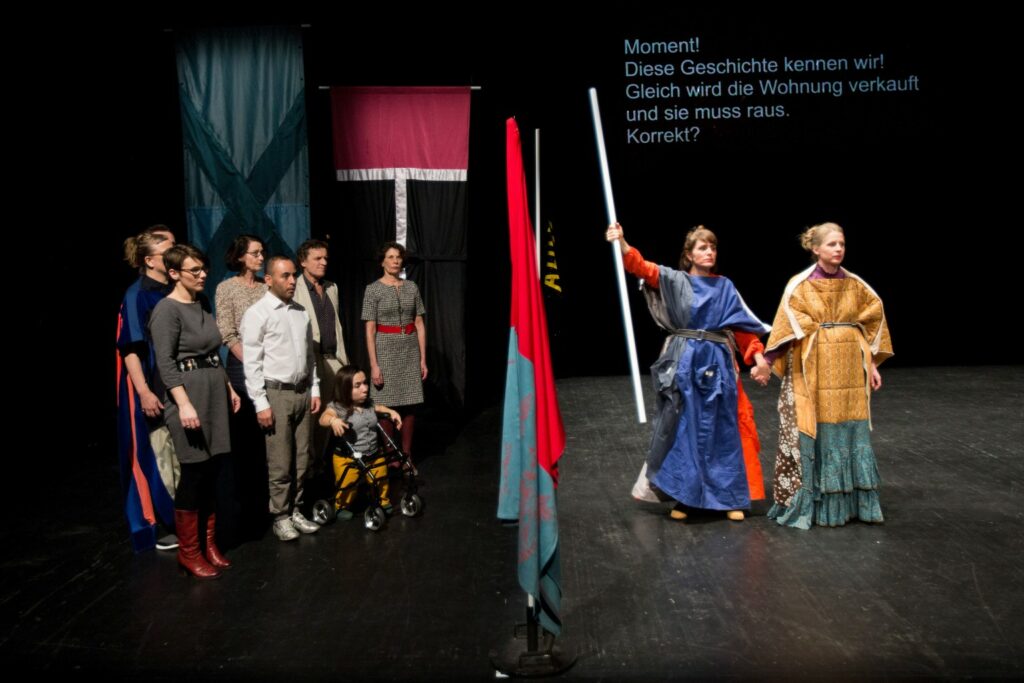How She She Pop’s Oratorium brilliantly turns the theatre into a space for pressing public discourse.
If the private is political, performance collective She She Pop makes it public – for better or worse. Over the course of 100 minutes, I will learn that my neighbour in the audience is rich and has an inheritance, while he will learn that I am a “class warrior” without a fixed income – revelations that create a certain awkwardness between us. These are just some of the many set categories into which this participative Brechtian Lehrstück splits the audience. The crowd collective is at once united through text passages addressed to everyone and divided through their unique economic situations: mothers without retirement funds alternate with would-be house buyers and freelancers give way to wealthy pensioners in a cacophony of audience choruses conducted by a giant teleprompter on the back wall of HAU1’s stage. But although Oratorium transforms spectators into agents, the performance robs them of any autonomy through the scripted-nature of their lines – a trick She She Pop cleverly use to both engage the audience but also disseminate their critique.
However, this is partly remedied though a healthy portion of humour and self-irony stuffed into each chorus’ dialogue for good measure. Even the sceptics amongst the audience are given their part, as are pompous-sounding theatre scholars explaining the oh-so-revolutionary dramatic theory behind this experimental performance. The result is a tongue-in-cheek (self-)assessment of privilege and privation that resonates strongly with an audience feeling the strain of urban gentrification. At its heart: a radical critique of the property relations that foster inequality within our society. But surrounding this political core is a well-paced evening of personal testimony, visual motifs and theatrical innovation – not to mention laughs.
Home for sale
Oratorium is a performance with its finger firmly on the pulse of our political zeitgeist and strikes a particular chord with its Kreuzberg audience. Just a stone’s throw away from the Hebbel am Ufer theatre is the Willy Brandt Haus – the headquarters of an SPD currently weathering a media shitstorm following youth-wing leader Kevin Kühnert-Marx’s frankly justified idealism in wanting to pry the housing sector from the claws of greedy capitalist investors. Meanwhile, a campaign to seize the private property giant Deutsche Wohnen’s housing stock and bring it under public control is gathering steam in the city. And of course Kreuzberg will always occupy a mythical place in the history of Berlin’s housing battles and squatting scene. Ihr kriegt uns hier nicht raus! It is precisely this ability to appeal to people’s most pressing existential worries and economic insecurities that gives Oratorium a sense of urgency. Yet it does this with a personal touch, tailoring its message to order as it tours the world from Bulgaria to Mexico through a local chorus of delegates on stage in each performance. In Berlin, the central story is a predictable personal anecdote that is at the same time universal, embodying the greatest fear of any tenant in the city: that dreaded letter from the Hausverwaltung informing you that your home is up for sale.
A rehearsal for what’s to come
Visually, She She Pop achieve a lot with very little. Where everyday life and biographical background form the bedrock of She She Pop’s productions at large, here their personal approach is afforded an aesthetic outlet on an otherwise austere stage through a rich visual tapestry of flags (wo)manmade from table cloths, bed sheets and other fabrics, that are then fashioned into robes to represent various roles throughout the production. These same materials are also hoisted onto poles resembling banners at a demonstration as the ensemble marches in a slow spacewalk towards the audience, further underscoring the link between the personal and the political. Yet they can also be decoded as antinationalist motifs that stress the global dimension of property inequality: a star-spangled banner and German schwarz-rot-gold tricolour are drained of their vivid hues and reduced to desaturated shells, while a tartan cloth is defaced with an anarchist circle-A. Harking back to the GDR for answers is also seemingly rejected by the performance collective, as an upside FDJ flag with a CCTV camera embroidered onto it makes clear, positioned on the side of the stage as if it were continuously observing the performance. In their assault on the material inequalities produced by a neoliberal free-market economy, She She Pop reject the polarising and failed cold-war binary of Western capitalism and Eastern state socialism, instead championing a critical yet utopian outlook towards the future.
All in all, Oratorium is a triumph of experimental performance: it democratises the space of the theatre to tap into a pressing public discourse, it blows up the concept of passive entertainment by highlighting our collective complicity in capitalistic property relations, and it delivers an inspiring show of solidarity in the process. But, aware of its own formal limitations, it ends on a self-critical, yet optimistic note. Question: what use is all of this? Answer: it’s a rehearsal for what’s to come. As the evening comes to a close and my neighbour and I return to our divergent economic realities, I feel that we both leave the theatre with a heightened sensibility for the nuances of property relations. And that’s a testament to a powerful, political performance. Bertie would approve.
